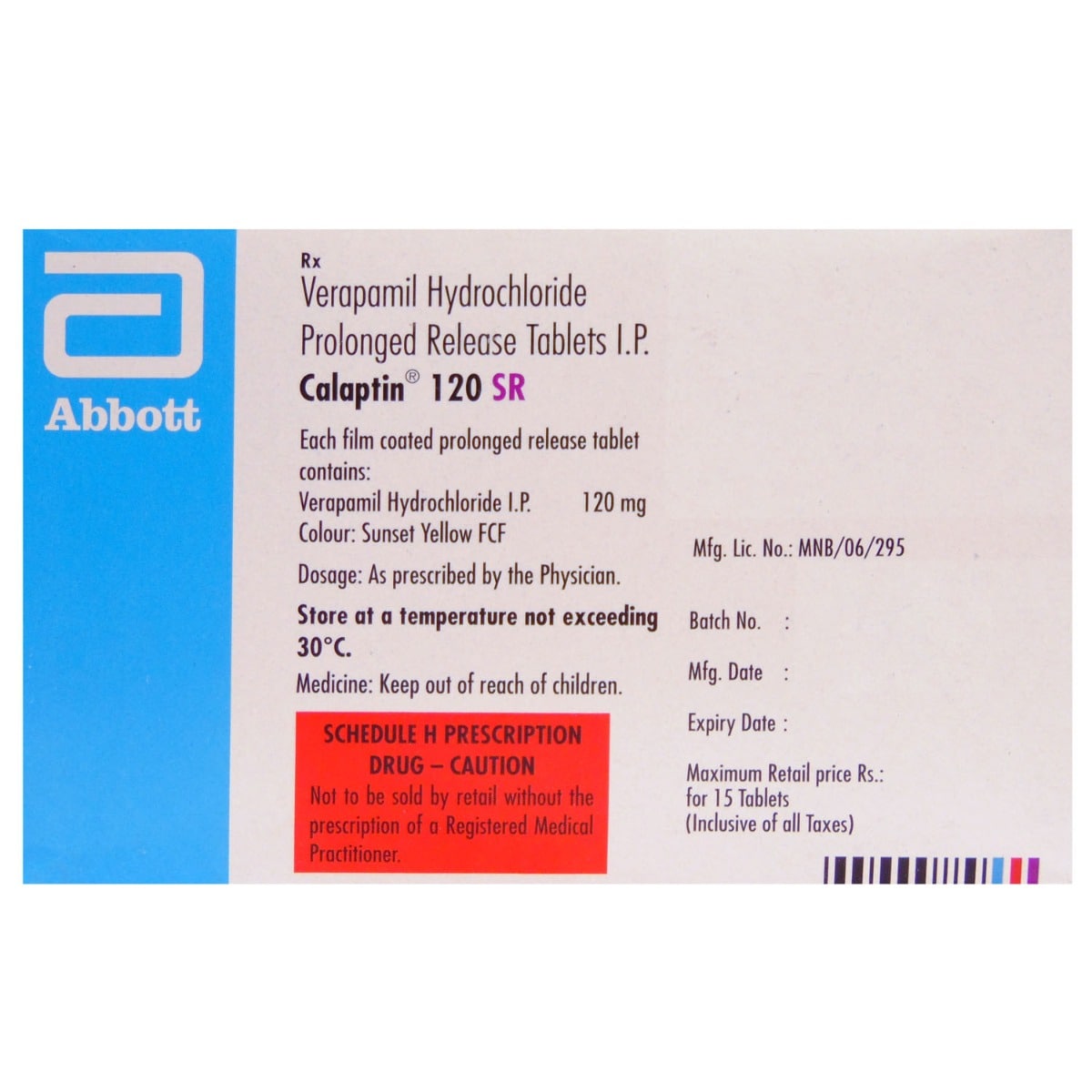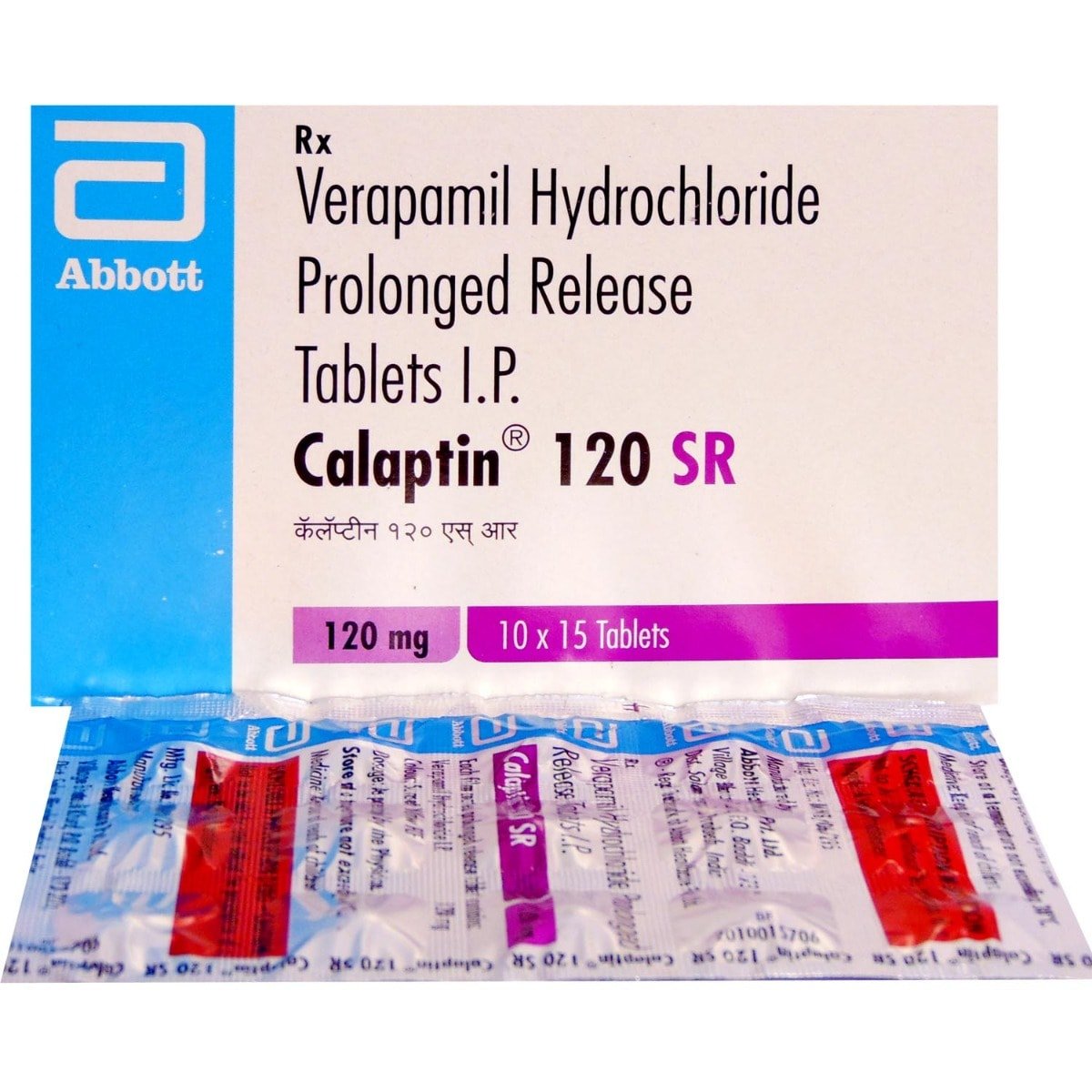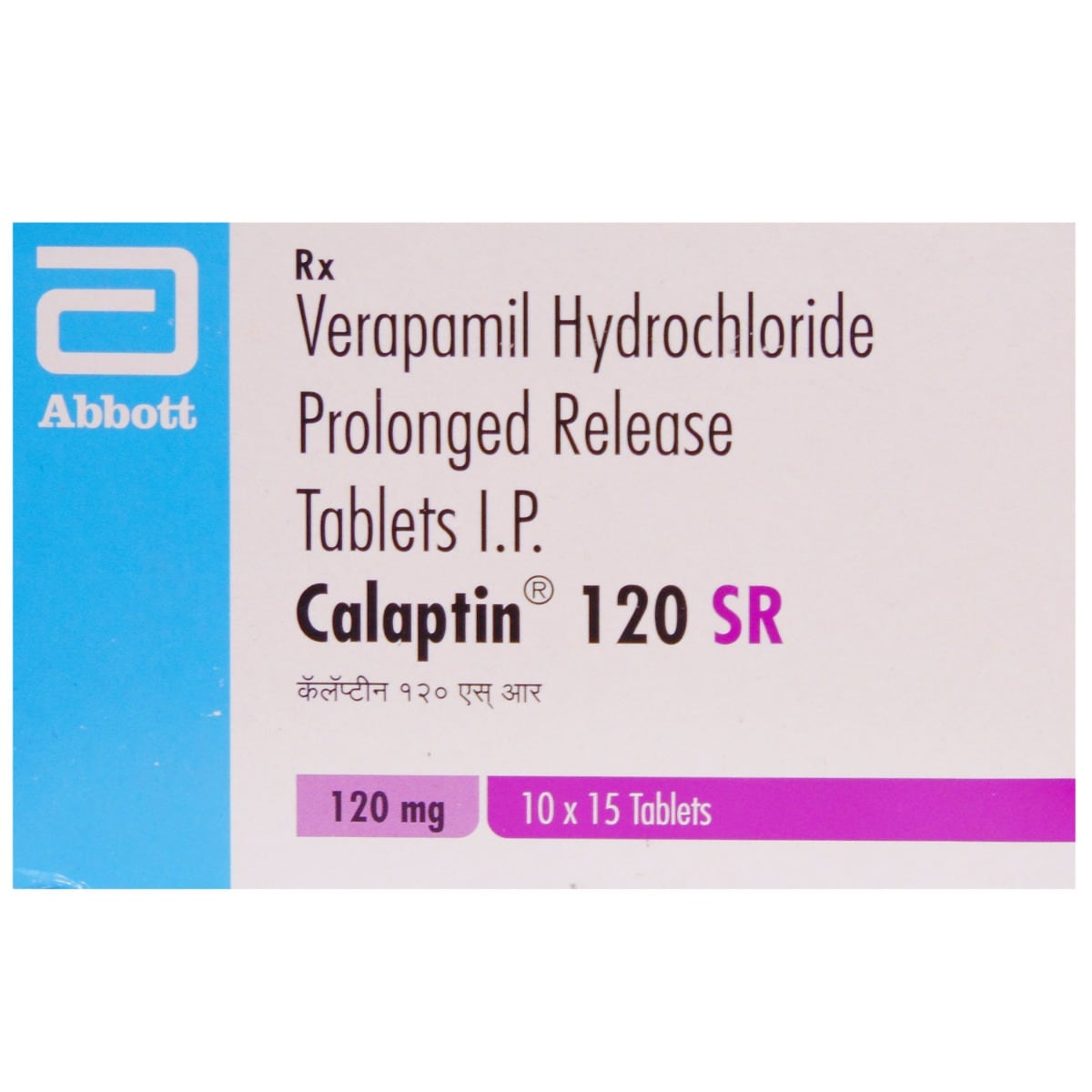Calaptin 120 SR Tablet 15's
MRP ₹87
(Inclusive of all Taxes)
₹13.1 Cashback (15%)
Selected Pack Size:15
15 ₹78.3
(₹5.22 per unit)
In Stock
Provide Delivery Location
Online payment accepted
 Prescription drug
Prescription drugWhats That
Composition :
Manufacturer/Marketer :
Consume Type :
Expires on or after :
Return Policy :
About Calaptin 120 SR Tablet
Calaptin 120 SR Tablet belongs to the class of medications called ‘calcium channel blockers used to treat hypertension, angina pectoris, and arrhythmias. Hypertension is a condition in which there is a persistent rise in blood pressure levels. Angina pectoris (angina) is chest pain due to reduced blood flow to the heart due to blockage or narrowing of blood vessels supplying the heart. Arrhythmia is a condition in which your heart beats irregularly, too fast or too slow.
Calaptin 120 SR Tablet contains ‘Verapamil’, which belongs to the class of ‘calcium channel blockers. It works by relaxing the blood vessels decreasing the workload on the heart. It also increases the blood and oxygen supply to the heart, thereby normalizing the electrical impulses. These effects help to reduce blood pressure and also control the rate and rhythm of the heartbeat.
Take Calaptin 120 SR Tablet as prescribed by your doctor. The common side effects of Calaptin 120 SR Tablet are nausea, constipation, headache, dizziness, and low blood pressure. These side effects usually don’t require treatment and gradually resolve over time. However, if these side effects persist or worsen, inform your doctor immediately.
It is not recommended to take Calaptin 120 SR Tablet if you are allergic to Calaptin 120 SR Tablet or any other contents present in it, have heart failure or severe problems with the rhythm of the heart (unless you have a pacemaker), have heart failure and taking beta-blockers, have had a heart attack recently, have a history of bradycardia (slow heart rate) or hypotension (low blood pressure), have Wolff-Parkinson-White syndrome (rapid heart rate associated with dizziness), and have been taking a medicine containing ivabradine for heart diseases. Calaptin 120 SR Tablet should be used with caution in patients with heart attacks and problems with the impulses in the heart, liver, and kidney diseases. Calaptin 120 SR Tablet should be used with caution in pregnant women and is probably safe when used in breastfeeding mothers. Calaptin 120 SR Tablet may increase the amount of alcohol in the body, so limit alcohol consumption. Calaptin 120 SR Tablet may cause dizziness, so do not drive or operate heavy machinery if you feel dizzy.
Uses of Calaptin 120 SR Tablet
Directions for Use
Key Benefits
Calaptin 120 SR Tablet contains ‘Verapamil’. It is used to treat high blood pressure. Lowering high blood pressure helps prevent strokes, heart attacks, and kidney problems. Verapamil belongs to a class of drugs known as calcium channel blockers. It works by relaxing blood vessels so blood can flow more easily.
Storage
- Hydrate your body: Drink enough water to prevent dehydration and headaches.
- Calm Your Mind: Deep breathing and meditation can help you relax and relieve stress.
- Rest and Recharge: Sleep for 7-8 hours to reduce headache triggers.
- Take rest: lie down in a quiet, dark environment.
- Cold or warm compresses can help reduce tension.
- Stay Upright: Maintain good posture to keep symptoms from getting worse.
- To treat headaches naturally, try acupuncture or massage therapy.
- Over-the-counter pain relievers include acetaminophen and ibuprofen.
- Prescription Assistance: Speak with your doctor about more substantial drug alternatives.
- Severe Headaches: Seek emergency medical assistance for sudden, severe headaches.
- Frequent Headaches: If you get reoccurring headaches, consult your doctor.
- Headaches with Symptoms: Seek medical attention if your headaches include fever, disorientation, or weakness.
- Inform your doctor about dizziness symptoms. They may adjust your medication regimen or prescribe additional medications to manage symptoms.
- Follow your doctor's instructions for taking medication, and take it at the same time every day to minimize dizziness.
- When standing up, do so slowly and carefully to avoid sudden dizziness.
- Avoid making sudden movements, such as turning or bending quickly, which can exacerbate dizziness.
- Drink plenty of water throughout the day to stay hydrated and help alleviate dizziness symptoms.
- If you're feeling dizzy, sit or lie down and rest until the dizziness passes.
- Track when dizziness occurs and any factors that may trigger it, and share this information with your doctor to help manage symptoms.
- Inform your doctor about your constipation symptoms. They may adjust your medication or advise alternative treatments.
- Stay hydrated by drinking sufficient of water (at least 8-10 glasses a day) to help soften stool and promote bowel movements.
- Increase fibre intake by eating foods high in fibre, such as fruits, whole grains, vegetables and legumes, to help bulk up the stool.
- Establish a bowel routine by trying to go to the bathroom at the same time each day to train your bowels.
- Engaging in regular exercise, like walking or yoga, can support in bowel movement stimulation.
- Consult your doctor if constipation persists, and discuss alternative treatments or adjustments to your medication.
- Rest well; get enough sleep.
- Eat a balanced diet and drink enough water.
- Manage stress with yoga and meditation.
- Limit alcohol and caffeine.
- Physical activities like walking or jogging might help boost energy and make you feel less tired.
- If you experience low blood pressure symptoms like dizziness, lightheadedness, or fainting while taking medication, seek immediate medical attention.
- Make lifestyle modifications and adjust your medication regimen under medical guidance to manage low blood pressure.
- As your doctor advises, regularly check your blood pressure at home. Record your readings to detect any changes and share them with your doctor.
- Fluid intake plays a vital role in managing blood pressure by maintaining blood volume, regulating blood pressure, and supporting blood vessel function. Drinking enough fluids helps prevent dehydration, maintain electrolyte balance, and regulate fluid balance.
- Take regular breaks to sit or lie down if you need to stand for long periods.
- When lying down, elevate your head with extra pillows to help improve blood flow.
- Avoid heavy exercise or strenuous activities that can worsen low blood pressure.
- Wear compression socks as your doctor advises to enhance blood flow, reduce oedema, and control blood pressure.
- If symptoms persist or worsen, or if you have concerns about your condition, seek medical attention for personalized guidance and care.
Drug Warnings
Calaptin 120 SR Tablet is not recommended in people using beta blockers as it may cause atrioventricular (AV) block (a type of heart block) and bradycardia (slow heart rate). Calaptin 120 SR Tablet is also not recommended in patients who have heart failure or severe problems with the impulse or rhythm of the heart (unless you have a pacemaker), had a heart attack recently, a history of bradycardia (slow heart rate) or hypotension (low blood pressure), and Wolff-Parkinson-White syndrome (rapid heart rate associated with dizziness). Calaptin 120 SR Tablet contains sunset yellow aluminium lake as a colourant, which may cause allergic reactions in some people. Please do not eat or drink products containing grapefruit as it may increase the effects of Calaptin 120 SR Tablet .
Drug-Drug Interactions
Drug-Drug Interactions
Login/Sign Up
Using lomitapide together with Calaptin 120 SR Tablet may significantly increase the blood levels of lomitapide.
How to manage the interaction:
Taking Calaptin 120 SR Tablet with Lomitapide is generally avoided as it can possibly result in an interaction. Call a doctor if you experience diarrhea, nausea, vomiting, stomach pain or discomfort, indigestion, gas, constipation, and yellowing of skin or eyes. Do not discontinue any medications without consulting a doctor.
Using flibanserin together with Calaptin 120 SR Tablet can significantly increase the blood levels of flibanserin.
How to manage the interaction:
Taking Calaptin 120 SR Tablet with Flibanserin is generally avoided as it can result in an interaction. Call a doctor immediately if you experience excessive drowsiness and decreases in blood pressure that can lead to dizziness, lightheadedness, fainting, and accidental injury, contact a doctor immediately. Do not discontinue any medications without consulting a doctor.
Coadministration of cisapride together with Calaptin 120 SR Tablet may significantly increase the blood levels of cisapride. This can increase the risk or severity of side effects.
How to manage the interaction:
Taking Calaptin 120 SR Tablet with Cisapride is not recommended, please consult a doctor before taking it. You should seek immediate medical attention if you develop sudden dizziness, lightheadedness, fainting, shortness of breath, or heart palpitations during treatment with cisapride.
The metabolism of Eliglustat can be decreased when combined with Calaptin 120 SR Tablet. This can increase the risk or severity of side effects.
How to manage the interaction:
Taking Calaptin 120 SR Tablet with Eliglustat is not recommended as it can result in an interaction, it can be taken if your doctor has advised it. However, if you experience sudden dizziness, lightheadedness, fainting, shortness of breath, chest pain or tightness, or rapid heartbeat, contact a doctor immediately. Do not discontinue any medications without consulting a doctor.
Taking Calaptin 120 SR Tablet with Arbutamine can increase the risk or severity of irregular heart rhythms.
How to manage the interaction:
Taking Calaptin 120 SR Tablet with Arbutamine together is generally avoided as it can result in an interaction, it can be taken when a doctor has advised it. However, if you experience irregular heartbeat, chest tightness, blurred vision, or nausea. contact a doctor immediately. Do not discontinue any medications without consulting a doctor.
Using pimozide together with Calaptin 120 SR Tablet can increase the blood levels and risk of developing irregular heart rhythms. The risk increases in patients with a history of heart illness or electrolyte imbalance.
How to manage the interaction:
Taking Calaptin 120 SR Tablet with Pimozide is generally avoided as it can cause an interaction. However, if you experience sudden dizziness, lightheadedness, fainting, shortness of breath, chest pain or tightness, rapid heartbeat, or memory loss, contact a doctor immediately. Do not discontinue any medications without consulting a doctor.
Using dofetilide together with Calaptin 120 SR Tablet may significantly increase the blood levels of dofetilide. This can increase the risk or severity of side effects.
How to manage the interaction:
Taking Calaptin 120 SR Tablet with Dofetilide is not recommended, please consult your doctor before taking it. You should seek immediate medical attention if you develop sudden dizziness, lightheadedness, fainting, shortness of breath, or heart palpitations. Do not discontinue any medications without first consulting a doctor.
Coadministration of Carbamazepine and Calaptin 120 SR Tablet can alter the blood levels and effects of both medications.
How to manage the interaction:
Although taking carbamazepine and Calaptin 120 SR Tablet together can result in an interaction, it can be taken if a doctor has prescribed it. However, if you have symptoms such as headache, nausea, vomiting, dizziness, confusion, slurred speech, visual abnormalities, tremors, or incoordination, consult a doctor immediately. Do not stop using any medications without a doctor’s advice.
Taking Halofantrine with Calaptin 120 SR Tablet can increase the risk or severity of irregular heart rhythms.
How to manage the interaction:
Although taking Halofantrine together with Calaptin 120 SR Tablet can result in an interaction, they can be taken together if prescribed by a doctor. However, consult a doctor if you experience dizziness, lightheadedness, fainting, shortness of breath, or heart palpitations (feelings that your heart races). Do not stop taking any medication without consulting a doctor.
Using Calaptin 120 SR Tablet and sotalol together may lead to increased risk or severity of side effects.
How to manage the interaction:
Although taking Sotalol together with Calaptin 120 SR Tablet can result in an interaction, they can be taken together if prescribed by a doctor. However, consult a doctor if you experience fatigue, headache, fainting, swelling of the extremities, shortness of breath, chest pain, or irregular heartbeat. Do not stop taking any medication without consulting a doctor.
Drug-Food Interactions
Drug-Food Interactions
Login/Sign Up
Grapefruit Juice
How to manage the interaction:
Consuming Grapefruit juice with Calaptin 120 SR Tablet can increase the blood levels and effects of Calaptin 120 SR Tablet. Avoid the Consumption of Grapefruit juice with Calaptin 120 SR Tablet. Contact a doctor if you experience sudden, unexplained weight gain, swelling of the hands, ankles, or feet, chest pain, or difficulty breathing.
Diet & Lifestyle Advise
- Keep your weight under control with BMI (Body Mass Index) 19.5-24.9.
- Do regular physical activity or exercise for at least 150 minutes per week, or about 30 minutes most days of the week. Doing this can help you to lower your raised blood pressure by about 5 mm of Hg.
- Opt for a diet rich in whole grains, fruits, veggies, and low-fat dairy products.
- If you are taking alcohol, then only one serving for women and two servings is advisable.
- Quitting smoking is the best strategy to lower the risk of heart disease.
- Avoid chronic stress, as it can raise your blood pressure. Meditation is suggested.
- Monitor your blood pressure daily and if there is too much fluctuation, immediately contact your doctor.
- Try to include heart-healthy omega-3 fatty acids-containing food drinks in your daily diet. You can also use low-fat cooking oil like olive oil, soybean oil, canola oil, and coconut oil to lower your elevated blood pressure.
Side Effects of Calaptin 120 SR Tablet
- Nausea
- Constipation
- Headache
- Dizziness
- Low blood pressure
Habit Forming
Therapeutic Class
All Substitutes & Brand Comparisons
RX
Out of StockVasopten 120mg Tablet
Torrent Pharmaceuticals Ltd
₹14.03
(₹1.26 per unit)
75% CHEAPER
Drug-Diseases Interactions
Drug-Diseases Interactions
Login/Sign Up
FAQs
Drug-Drug Interactions Checker List
- IVABRADINE
- DIGOXIN
- PRAZOSIN
- ATENOLOL
- BISOPROLOL
- METOPROLOL
- PROPRANOLOL
- CIMETIDINE
- PHENOBARBITAL
- CARBAMAZEPINE
- PHENYTOIN
- RIFAMPICIN
- ERYTHROMYCIN
- CLARITHROMYCIN
- TELITHROMYCIN
- RITONAVIR
- LITHIUM
- IMIPRAMINE
- HYPERICUM PERFORATUM
- THEOPHYLLINE
- MIDAZOLAM
- SIMVASTATIN
- ATORVASTATIN
- ASPIRIN
- ALMOTRIPTAN
- DABIGATRAN
- QUINIDINE
- FLECAINIDE
- COLCHICINE
- SULFINPYRAZONE
- GLIBENCLAMIDE
- CICLOSPORIN
- SIROLIMUS
- EVEROLIMUS
- TACROLIMUS
Special Advise
- Let your doctor know that you are taking Calaptin 120 SR Tablet if you are scheduled for surgery where an anaesthetic will be used (including dental treatment).
- Calaptin 120 SR Tablet may cause low blood pressure and dizziness, so rise slowly from sitting or lying.
- Please do not stop taking the medication without discussing it with your doctor.
Disease/Condition Glossary
Hypertension: It is a chronic condition when blood pressure is too high. Blood pressure is the amount of blood pumped by the heart and the amount of resistance exerted by the arteries against the blood flow. If the heart pumps more blood, then arteries become narrower, and in turn, blood pressure becomes high. If blood pressure becomes uncontrolled, it may cause serious heart disease, including stroke and heart attack. High blood pressure also causes brain damage (stroke) and kidney failure. Blood pressure is expressed by systolic and diastolic. Systolic blood pressure represents the contraction and relaxation of the heart. Diastolic represents the pressure in the vessels when the heart beats and is in a resting state. Ideal blood pressure should be between 90/60mmHg and 120/80mmHg. Hypertension is detected when systolic blood pressure is more than 140mmHg, and diastolic pressure is higher than 90mmHg. Some symptoms of hypertension include headache, nose bleeding, vomiting, and chest pain.
Angina pectoris: It is the medical term for heart-related chest pain. It occurs when there is a reduction in blood supply to the heart due to the blockage of one or more arteries (coronary heart disease). Patients with angina often explain chest pain as squeezing, tightening, or pressure in the chest. Other symptoms can be dizziness, sweating, heartburn, and difficulty breathing.
Arrhythmia: Arrhythmia is a condition in which your heart beats irregularly, too fast, or too slow. Symptoms of irregular heartbeat include chest pain, shortness of breath, and fast or slow heartbeat. 60 to 100 beats per minute is generally considered a normal heart rate.

Have a query?
Alcohol
Safe if prescribed
It is not recommended to consume alcohol while using Calaptin 120 SR Tablet as it may worsen your condition.
Pregnancy
Consult your doctor
Calaptin 120 SR Tablet should be used with caution in pregnancy as it may harm your unborn baby. Please consult your doctor before using this medicine.
Breast Feeding
Consult your doctor
Calaptin 120 SR Tablet is considered safe to be used in pregnancy. Your doctor will weigh the benefits and any potential risks before prescribing this medicine. Please consult your doctor.
Driving
Safe if prescribed
Calaptin 120 SR Tablet may cause dizziness, so do not drive or operate heavy machinery if you feel dizzy after taking this medicine.
Liver
Consult your doctor
Calaptin 120 SR Tablet should be used with caution if you have liver conditions. Your doctor may adjust the dose based on your condition.
Kidney
Consult your doctor
Calaptin 120 SR Tablet should be used with caution if you have kidney conditions. Your doctor may adjust the dose based on your condition.
Children
Safe if prescribed
Calaptin 120 SR Tablet should be used in children below 12 years only if clinically needed and if the benefits outweigh the risks. It is not recommended for use in young infants.
Recommended for a 30-day course: 2 Strips










